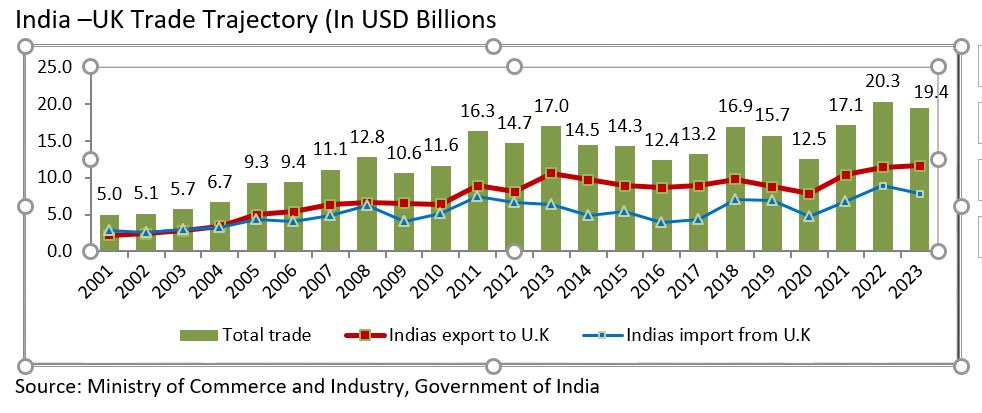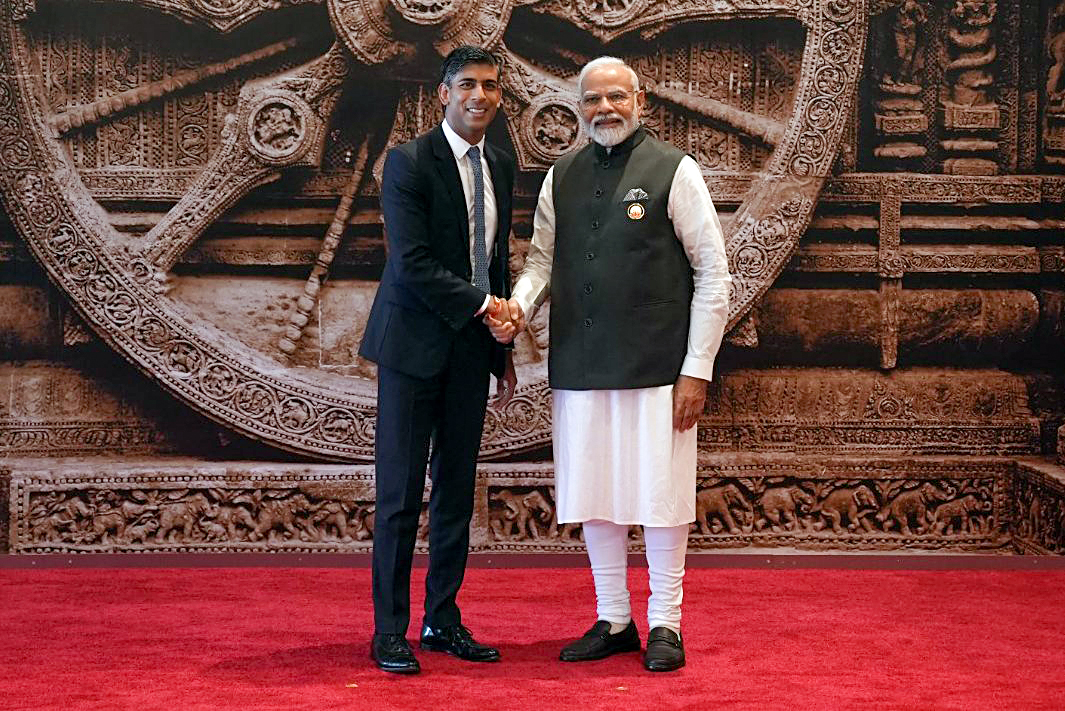Ambitious trade pact will double trade by 2030 and expand business horizons between the two prestigious democracies … writes Kaliph Anaz
Strong bilateral economic relations between India and the UK hold immense significance in an era of geo-political conflicts. Free Trade Agreement (FTA) between these two vibrant economies will boost bilateral trade and investment flows. The strong synergies between India and UK has potential to generate numerous job opportunities, strong economic development and enhanced social welfare in both the nations.
India and the United Kingdom have risen as significant participants in the global trade trajectory with meaningful trade facilitation measures. The future prospects for trade and investments between India and UK are highly promising and enduring, spanning not just the upcoming years but many decades ahead. The fourteenth round of negotiations for a Free Trade Agreement (FTA) between India and the UK has been finalized, with the subsequent round anticipated to begin following the Indian General Elections.
The alliance between India, the world’s largest democracy, and the UK, the oldest democracy, is described as dynamic and reinforcing. India has continuously endeavored to elevate its association with UK from merely bilateral trading partners to staunch strategic allies. In recent times, both nations have endeavored to construct a framework encompassing various sectors, including a broad array of products and investment domains, to enhance their collaboration.
A significant potential exists across the sectors such as education and skill enhancement, smart cities and technology integration, advanced manufacturing, and engineering, among others, owing to the robust and extensive relations between India and UK. India’s vast and highly skilled human capital aligns well with the technological expertise of the UK, while British firms possess the capability to support India in developing crucial infrastructure, particularly in logistics and construction. The modern partnership between India and the United Kingdom is deeply rooted in significant historical connections. The partnership between the two dynamic economies is already vast due to their inherent strengths, with collaboration ranging from agriculture to space, and holds enormous potential to grow even further.
The fourteenth round of negotiations for a free trade agreement (FTA) between India and the UK concluded in March 2024, with the subsequent round slated to begin post the Indian general elections. These talks, initiated in January 2022, are geared towards bolstering bilateral trade, currently estimated at approximately USD 19.4 billion annually. Both parties are dedicated to achieving a “bold” agreement, yet acknowledge the necessity for further deliberations to solidify terms encompassing goods, services, and investment. The UK aims for reduced tariffs on exports to India, while India expresses concerns regarding the equitable treatment of Indian workers in the UK.
Economic relations between the two countries are dynamic as the society is evolving in consonance with the economic interests and perceptions of the people. India’s trade with the UK has expanded from USD 5 billion in 2001 to USD 19 billion in 2023-24. India’s exports to the UK are around USD 11.6 billion, and imports from the UK are USD 7.8 billion.
India –UK Trade Trajectory (In USD Billions

Source: Ministry of Commerce and Industry, Government of India
Approximately 57% of India’s exports to the UK comprise consumer goods, whereas raw materials and consumer products make up around 31% of the total imports from UK. While India’s market presence in the UK has remained stable, there has been notable resurgence in the UK’s market share recently. Additionally, India boasts an exceptionally diverse range of exportable products, thereby rendering Indian exporters relatively less vulnerable to market fluctuations in a volatile trading landscape. With recent initiatives undertaken by India and the broadening of foreign direct investment (FDI) across various sectors, it is anticipated that investments from the UK will soon witness a significant upturn.
As the India-UK Free Trade Agreement (FTA) advances quickly, both countries should keep looking for methods to enhance their current trade relationship. Aside from developing the bilateral enhanced trade partnership (ETP), the deal should also remove market access restrictions to help promote the movement of products, services, capital, technology, and people between the two economies.
The UK is the sixth-largest investor in terms of FDI, with USD 34.8 billion flowing into India between April 2000 and December 2023. 5% of all FDI to India came from the UK. The sectors attracting the majority of foreign investment from UK are financial services; professional, scientific and technical services; retail and wholesale trade; transportation and storage. According to the Department for International Trade’s (DIT) figures on inward investment for 2022-2023, Indian businesses established 118 FDI projects in the UK during this time and added 8384 new employment. The entrepreneurial ecosystem in both countries can significantly be changed through collaboration in the business and investment sectors.
The Free Trade Agreement (FTA) with the UK aims to establish transparency, consistency, and clarity, along with crafting a service framework that fosters bilateral competition. By addressing market concerns and dismantling trade barriers on both ends, the FTA is poised to foster growth across businesses and industries while bolstering exports. The agreement will offer UK exporters improved entry into the Indian market, benefiting various sectors such as ICT, financial services, food and beverage, fruits, automobiles, and pharmaceuticals. This FTA holds particular significance for India as it is expected to boost exports in industries like textiles, leather goods, and footwear, consequently enhancing employment opportunities domestically.
Trajectory of India-UK bilateral relations
| S.No | Features | Data |
| 1. | India-UK Total Trade in 2023-24 | USD 19.4 Billion |
| 2. | India’s export to UK in 2023-24 | USD 11.6 Billion |
| 3. | India’s Import from UK in 2023-24 | USD 7.8 Billion |
| 4. | Consumer Goods share in India’s export to UK | 57 % |
| 5. | Raw materials and consumer goods share in UK imports | 31% |
| 6. | FDI: UK 6th biggest investor in India (April 2000- December 2023) | USD 34.8 Billion |
| 7. | UK’s share in India’s total FDI. | 5% |
| 8. | Projects between India & UK | Indian companies created 118 FDI projects in the UK in 2022-23, created 8384 new jobs. |
In conclusion, the bilateral economic ties between India and the UK hold significant importance amidst the prevailing global economic uncertainties, particularly in light of recent geo-political conflicts. The potential signing of a Free Trade Agreement (FTA) between these two dynamic economies will amplify bilateral trade and investment avenues. The inherent complementarities between India and the UK harbors the potential to generate substantial employment opportunities, elevate incomes, and enhance living standards along with a strong geo-political presence in the World of uncertainties.

Leave a Reply